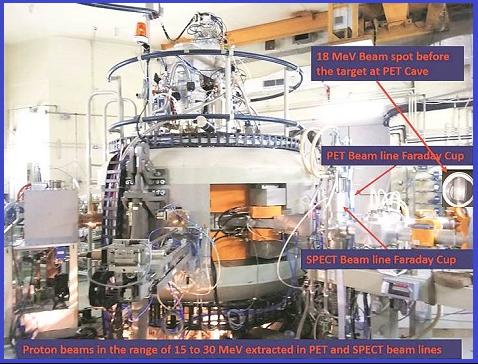Updated By: LatestGKGS Desk
India’s biggest cyclotron facility 'Cyclone-30' becomes operational

India’s biggest cyclotron facility 'Cyclone-30' becomes operational: Details, Features, Significance, Highlights
India’s biggest cyclotron facility named Cyclone-30 became operational at Kolkata-based Variable Energy Cyclotron Centre (VECC), which comes under Department of Atomic Energy (DAE).
Cyclotron is used to produce radioisotopes for diagnostic and therapeutic use for cancer care. Radiations from these isotopes are used to destroy cancer cells.
The Cyclone-30 machine will produce radioisotopes crucial for diagnosis and treatment of cancer. It will be first and only cyclotron facility in the country to produce Germanium 68 radioisotopes, which is used in the diagnosis of breast cancer.
The Cyclone-30 machine will also produce Palladium 103 isotopes, which is used for the treatment of prostate cancer. In its future stages, it will also produce Iodine 123 isotopes, which can help detect thyroid cancer.
The Cyclone-30 machine started working for the first time when 30 MeV beam reached Faraday Cup (a metal cup designed to catch charged particles in the vacuum). The beam from this facility was used to produce fluorine-18 isotope for preparation of radiopharmaceutical fluorodeoxyglucose (FDG), which is used for diagnosing various types of cancer.
The Cyclone-30 machine will start regular production by mid-2019 after supporting nuclear systems and regulatory clearances are commissioned.
Significance
The Cyclone-30 machine will provide for affordable radio-isotopes and related radiopharmaceuticals for the entire country, especially for eastern states like West Bengal.
The Cyclone-30 machine will also help in bringing down imports while raising the possibility of exporting radioisotopes in the future. It also has an export potential for germanium-68 and gallium-68 generator for in-situ production of gallium-68 and palladium-103 isotopes, which are used for breast cancer diagnosis and prostate cancer treatment, respectively.
The Cyclone-30 machine can also be used for research in the fields of material science and nuclear physics.